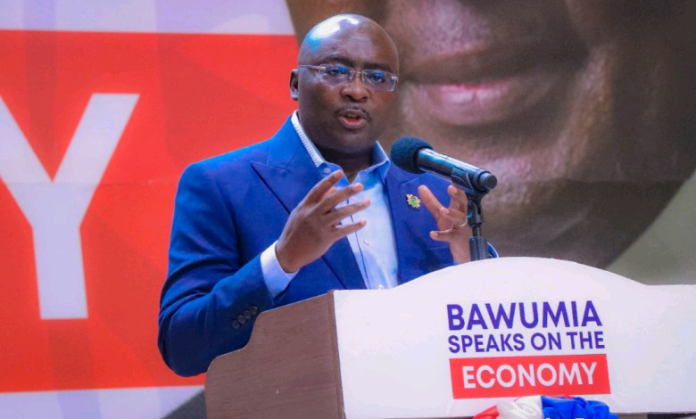The Vice-President, Dr Mahamudu Bawumia has said that the worst performance of the Ghana cedi occurred in the erstwhile former President John Mahama’s administration where the average depreciation rate was 18%.
According to him, the “average exchange rate depreciation during 2017-2021, at 6.8% under our government, is more than twice as stable than during the 2013-2016 period.”
Speaking on the state of the economy at the national TESCON conference in Kasoa on Thursday (7 April), Dr Bawumia said in the history of the Fourth Republic, the worst performances for exchange rate depreciation happened from 1993 to 2000 and 2009-2016.
Depreciation of the Cedi in Q1 2022
The first quarter of 2022 has, however, seen the sharpest first quarter depreciation of the cedi since 2015. Data from the Bank of Ghana shows that at the end of March the Cedi had depreciated by 15.5%.
He added that a number of factors can be contributed to the fast depreciation of the cedi in the first quarter of 2022.
He said: “The financial markets assessment of the 2022 Budget generally concluded that the projected 40% increase in revenue underpinning the budget would likely not materialize and therefore the deficit will be higher than projected.
“The chaotic battle in parliament over the budget created uncertainty and signalled to the markets that the government may not be able to get most of its programs passed in a tightly balanced parliament. This further reinforced the lack of confidence investors in the budget.”
“Furthermore, delays in implementing major tax reforms such as the benchmark policy reversal, tax exemptions bill, common platform for property tax, and the review of fees and charges appeared to support the assessment of the market that the government will have difficulty in getting its programs through parliament. To add to this negative market sentiment, there was a sovereign credit rating downgrade by Fitch and Moodys as a result of concerns about fiscal and debt sustainability. This resulted in an unwillingness of foreign investors to roll over holdings of domestic debt. They demanded foreign exchange to repatriate their investments.”
He added that the lack of access to the sovereign bond market by emerging markets and Ghana’s announcement that it would not issue a sovereign bond in 2022 worried investors about the adequacy of Ghana’s foreign exchange reserves going forward.
According to Bawumia, the increases in interest rates by central banks in the US and other advanced economies also made cedi assets less attractive and led to a move out of cedi holdings.
He maintains that “the combination of these factors resulted in a sharp depreciation of the cedi exchange rate in the first quarter. The depreciation of the cedi was fundamentally about the market’s assessment of the fiscal stance of the government and its implications for fiscal and debt sustainability. This was the primary factor in the rating downgrade.”
Source: Daily Mail GH





